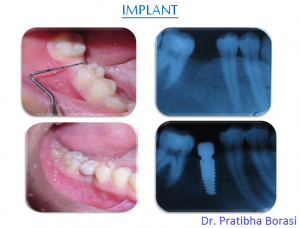Dental implants
Dental implants are metal posts or frames that are surgically situated into the jawbone beneath your gums. Once in place, they permit your dentist to mount replacement teeth onto them. Because implants fuse to your jawbone, they give stable support for artificial teeth. Dentures and bridges mounted to implants won’t slip or shift in your mouth — an especially important benefit when eating and speaking. This secure fit helps the dentures and bridges — as well as individual crowns placed over implants — feel more usual than conventional bridges or denture.
Dental implants are the next best thing to your healthy, natural teeth. Strong and constant, a dental implant restores a lost tooth so that it looks feels, fits and functions like a natural tooth when implanted by an experienced implant dentist. Other choice such as dentures or bridges can lead to bone deterioration, and may interfere with eating, smiling, speaking and other activities of everyday life.
Dental implants are built to last. That makes them your best long-term, cost-effective solution. Traditional, tooth-supported dental bridges only last five to seven years, and with appropriate care often more than 10 years, but at some point they may need to be replaced. Those costs can actually add up over time. While dental implants may require periodic adjustments, they can last a lifetime when properly placed and cared for over time by your local dental implant expert.
A dental implant is an artificial tooth root that is placed into your jaw to hold a replacement tooth or bridge. Dental implants may be a choice for people who have lost a tooth or teeth due to periodontal disease, an injury, or some other cause.
FAQ About Dental Treatments
Many people do not see a dentist on a habitual basis. They only go when they have a difficulty. This is called “crisis treatment” versus “preventive treatment.”. This is because so many dental troubles do not have symptoms until they reach the higher stages of the disease process.
Tooth decay often does not harm until it gets close to the nerve of the tooth. It is not unusual to see a patient with a huge cavity who has never felt a thing. The dentist can generally detect a cavity 3-4 years before it develops any sign. This early detection can help you prevent root canal treatment.
Make it fun! If you are excited about brushing your teeth, your children will also be enthusiastic. Children want to do the things their parents do. If your children observe you brushing your teeth and show good dental habits, they will follow.
Much illness of the teeth and surrounding tissues cannot be seen when the dentist examines the mouth. An X-ray examination may reveal:
- little areas of decay between the teeth or below existing restorations (fillings)
- infections in the bone
- periodontal (gum) disease
- abscesses or cysts
- developmental abnormalities
- some types of tumors
A mouth guard can stop damage to your face and teeth. Most people benefit from wearing a mouth guard when playing any sport. You should wear one whether you are playing professionally or just on weekends. Do what you can to preserve your smile and your health. The best mouth guards are custom-fitted by your dentist. This is especially important if you wear braces or fixed bridgework.

